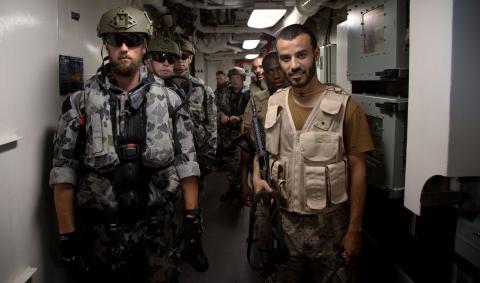It was Marlon Brando’s character in The Godfather, Don Vito Corleone who uttered the famous words ‘I’ll make him an offer he can’t refuse’. In the current imbroglio between Qatar and the Saudi-led bloc, the 13-point list of demands issued by Riyadh could well be described as making Doha an offer it can’t accept. We are led to believe the demands included the closure of al-Jazeera television, the downgrading of diplomatic relations with Iran, the closure of a Turkish military base in Qatar and the payment of reparations for the opportunity costs claimed by the document’s authors. And a reporting mechanism to check adherence monthly for the first year and then annually for the next decade. And Qatar was given just 10 days to accept these terms. There is obviously no way that a state could agree to such attacks on its sovereignty.
Tension between Qatar and its neighbours is not new, but this time both the public nature of the dispute and the significant diplomatic and economic sanctions against Doha are of an order of magnitude not seen previously. For all the talk of sponsoring terrorists and of a too-close relationship with Iran, perhaps the most open point of friction is Doha’s support for the Muslim Brotherhood. Gulf states understand that it is political Islam in the shape of the Muslim Brotherhood, rather than terrorism or Iran, that is a real existential threat to them. Doha’s support for Muslim Brotherhood-aligned groups was the key element of the last diplomatic imbroglio between Doha and its neighbours in 2014.
There are, of course, other contextual aspects involved. These include an emboldened Saudi Arabia that is looking to establish itself as the regional leader now it feels the Trump Administration has done away with the Obama Administration’s circumspection regarding Riyadh’s ability to be a force for regional stability. There is also a belief that Doha has not followed through with the actions expected of it following the 2014 diplomatic upset. And there is the need to demonstrate how essential Sunni Arab solidarity is in the face of fears that Iran and its proxies are on the move.
The problem of course at this point is the nature of the 13 demands made by Riyadh. Satisfying these would require complete capitulation by Qatar. The making of such precipitous demands bears an unflattering resemblance to Riyadh's equally hard-nosed but poorly thought out military action against Yemen. Punitive action without any clear sense of a strategic end state can often weaken a state's power rather than enhance it. If Saudi Arabia can't make Doha dance to its tune, then Riyadh runs the risk of further reducing regional states' confidence in its leadership capabilities. Last night's meeting in Cairo of the boycotting states' foreign ministers produced a statement and a commitment to meet again later in Bahrain and the statement's principles may serve as the basis for future negotiations, replacing the existing draconian demands.
With support from Turkey and Iran, and a bifurcated response from Washington between the White House and the State Department, there is little pressure on the Qatari ruling family from outside the Arab League. For their part, those who authored the 13-point list would surely have known what they were asking was too onerous to ever be agreed to (if they didn't, it exhibits the type of hubris that doesn't bode well for the future) and militarising the dispute is not a realistic option. So there are few options open to bring an end to the dispute. Riyadh and its allies could perhaps squeeze members of the Qatari business elite and use them to pressure the al-Thanis from within, but the ruling elite can also play the Qatari nationalism card and draw on enormous national wealth to survive.
Qatar of course has some of its own weapons that it can employ – it has already announced a 30% increase in its production of LNG (with potential downsides for other expoters including Australia) - and half of UAE's electricity needs are met by Qatari gas through a jointly-owned pipeline. And although there is a port ban for Qatari vessels the supertankers that often carry a mix of crudes from different countries appear to be exempt.
This dispute may well continue for longer than many anticipated when it began. As the Kuwaitis act as the mediators and go-betweens in this drama, and the region goes into its school holiday slumber, it is likely to be a long, hot summer of negotiations.

